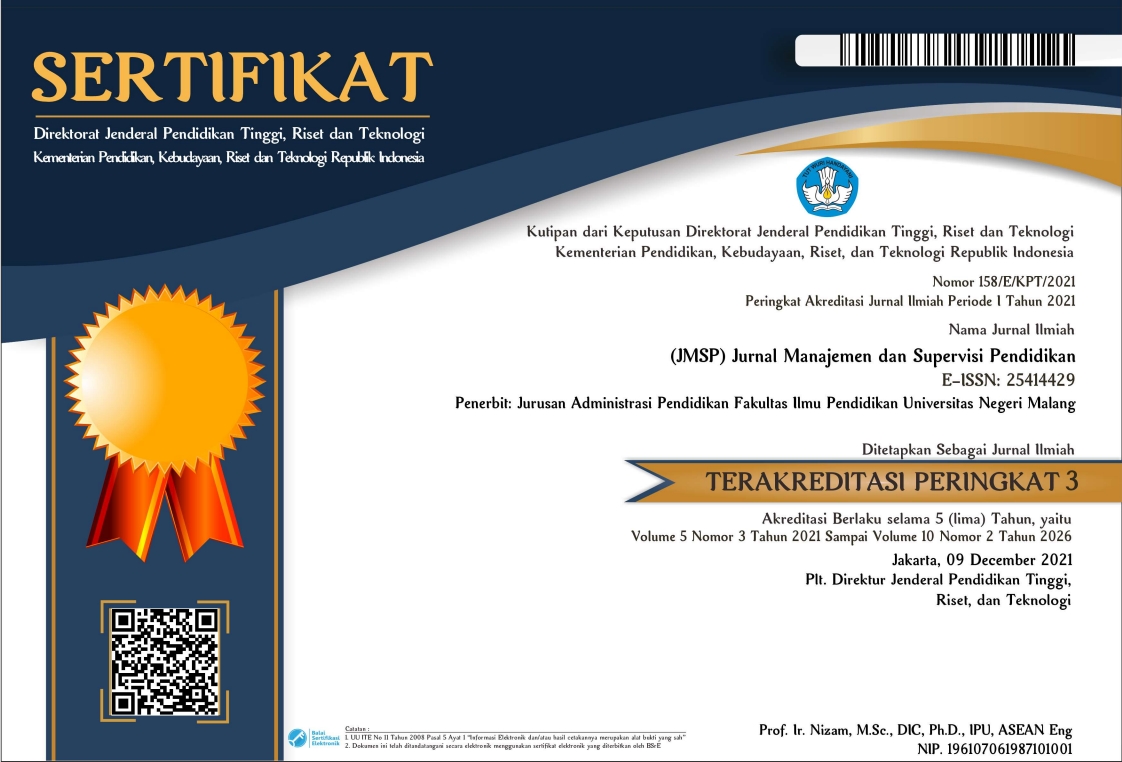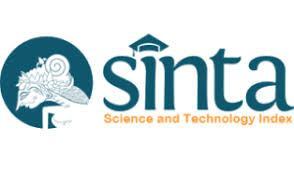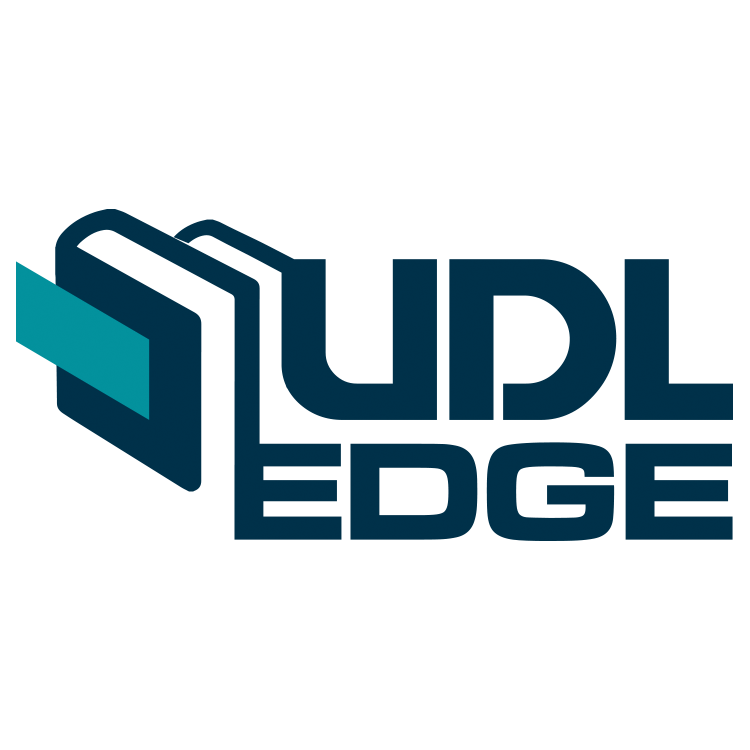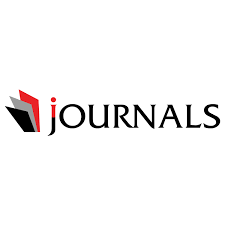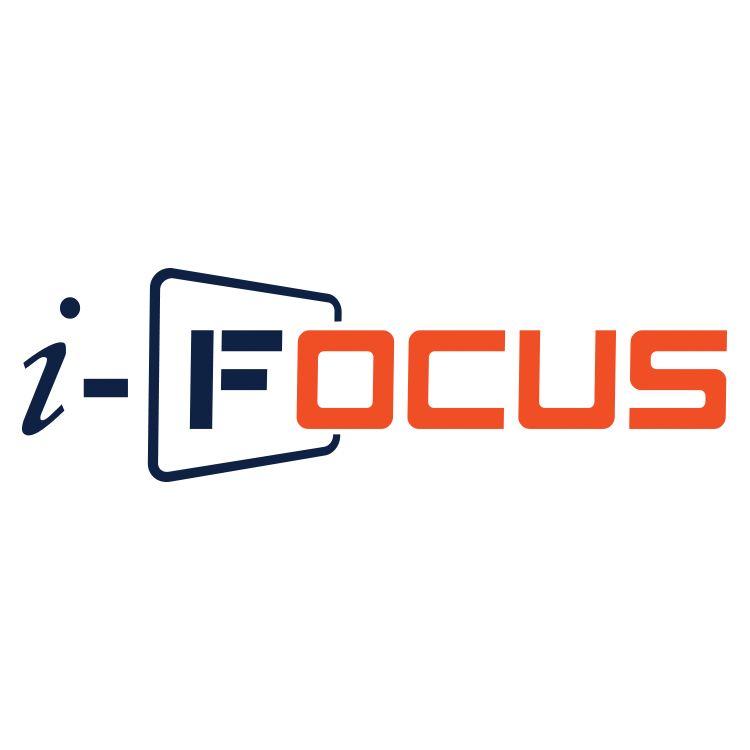Pengaruh Aktivitas Berbagi Pengetahuan dan Mediasi Budaya terhadap Kemampuan Inovasi Guru
Abstract
Abstract: This study aims to measure the influence of tacit and explicit knowledge on teacher teacher innovation capability in Indonesia mediated by organizational culture. Data collection was carried out by simple random sampling via electronic to a population of teachers in Jabodetabek. The returned and valid questionnaire results were 231 samples. Data processing using SEM method with SmartPLS 3.0 software. The results of this study are tacit knowledge sharing has a positive and significant effect on teacher innovation capability, both directly and through mediating organizational culture. While explicit knowledge sharing only has a positive and significant effect on teacher innovation capability through organizational culture mediation. This novel research is proposing a model to build teacher innovation capability among teachers through tacit & explicit knowledge sharing with organizational culture as mediation. This research can pave the way to improve teacher readiness in facing the era of education 4.0.
Abstrak: Penelitian ini bertujuan untuk mengukur pengaruh tacit dan eksplisit knowledge terhadap kemampuan inovasi guru guru di Indonesia yang dimediasi oleh budaya organisasi. Pengumpulan data dilakukan secara simple random sampling melalui elektronik terhadap populasi guru di Jabodetabek. Hasil kuesioner yang kembali dan valid sebanyak 231 sampel. Pengolahan data menggunakan metode SEM dengan software SmartPLS 3.0. Hasil penelitian ini adalah tacit knowledge sharing berpengaruh positif dan signifikan terhadap kapabilitas inovasi guru, baik secara langsung maupun melalui mediasi budaya organisasi. Sedangkan berbagi pengetahuan eksplisit hanya berpengaruh positif dan signifikan terhadap kemampuan inovasi guru melalui mediasi budaya organisasi. Penelitian baru ini mengusulkan suatu model untuk membangun kapabilitas inovasi guru di antara para guru melalui tacit dan eksplisit knowledge sharing dengan budaya organisasi sebagai mediasi. Penelitian ini dapat membuka jalan untuk meningkatkan kesiapan guru dalam menghadapi era pendidikan 4.0.
Keywords
Full Text:
PDFReferences
Afsar, B., Masood, M., & Umrani, W. A. (2019). The role of job crafting and knowledge sharing on the effect of transformational leadership on innovative work behavior. Personnel Review. doi:10.1108/pr-04-2018-0133
Al-Kurdi, O., El-Haddadeh, R., & Eldabi, T. (2018). Knowledge sharing in higher education institutions: a systematic review. Journal of Enterprise Information Management, 31(2), 226–246. doi:10.1108/jeim-09-2017-0129
Asbari, M., Purwanto, A., & Santoso, P. B. (2019). Influence of Leadership, Motivation, Competence, Commitment and Culture on ISO 9001:2015 Performance in Packaging Industry. Scholars Journal of Economics, Business and Management, 6(12), 577–582. https://doi.org/10.36347/sjebm.2019.v06i12.005
Asbari, M., Purwanto, A., Maesaroh, S., Hutagalung, D., Mustikasiwi, A., Ong, F., & Andriyani, Y. (2020). Impact of Hard Skills, Soft Skills and Organizational Culture : Lecturer Innovation Competencies As Mediating. EduPsyCouns: Journal of Education, Psychology and Counseling, 2(1), 142–155. https://ummaspul.e-journal.id/Edupsycouns/article/view/419
Bani-Melhem, S., Zeffane, R. and Albaity, M. (2018), "Determinants of employees’ innovative behavior", International Journal of Contemporary Hospitality Management, Vol. 30 No. 3, pp. 1601-1620. https://doi.org/10.1108/IJCHM-02-2017-0079
Culot, G., Orzes, G., & Sartor, M. (2019). Integration and scale in the context of Industry 4.0: the evolving shapes of manufacturing value chains. IEEE Engineering Management Review, 1–1. doi:10.1109/emr.2019.2900652
Ghozali, I. Structural Equation Modeling, Metode Alternatif dengan Partial Least Square (PLS), Edisi 4. Semarang: Badan Penerbit Universitas Diponegoro. 2014.
Gunasekaran, A., Subramanian, N., & Ngai, E. (2018). Quality Management in the 21st Century Enterprises: Research pathway towards Industry 4.0. International Journal of Production Economics. doi:10.1016/j.ijpe.2018.09.005
Haamann, T., & Basten, D. (2018). The role of information technology in bridging the knowing-doing gap: an exploratory case study on knowledge application. Journal of Knowledge Management. doi:10.1108/jkm-01-2018-0030
Hair, J. F., Black. W. C., Babin. B. J.; and Anderson. R. E. (2010), Multivariate Data Analysis, 7th ed. New Jersey: Pearson Prentice Hall.
Hamada, T. (2019). Determinants of Decision-Makers’ Attitudes toward Industry 4.0 Adaptation. Social Sciences, 8(5), 140. doi:10.3390/socsci8050140
Hartley, J. (2018), "Ten propositions about public leadership", International Journal of Public Leadership, Vol. 14 No. 4, pp. 202-217. https://doi.org/10.1108/IJPL-09-2018-0048
Hodgins, M. and Dadich, A. (2017), "Positive emotion in knowledge creation", Journal of Health Organization and Management, Vol. 31 No. 2, pp. 162-174. https://doi.org/10.1108/JHOM-06-2016-0108
Holste, J. S., & Fields, D. (2010). Trust and tacit knowledge sharing and use. Journal of Knowledge Management, 14(1), 128–140. doi:10.1108/13673271011015615
Hussain, S. T., Lei, S., Akram, T., Haider, M. J., Hussain, S. H., & Ali, M. (2018). Kurt Lewin’s change model: A critical review of the role of leadership and employee involvement in organizational change. Journal of Innovation & Knowledge, 3(3), 123–127. doi:10.1016/j.jik.2016.07.002
Hutagalung, D., Sopa, A., Asbari, M., Cahyono, Y., Maesaroh, S., & Chidir, G. (2020). Influence of Soft Skills, Hard Skills and Organization Learning on Teachers’ Performance through Innovation Capability as Mediator. Journal of Critical Reviews, 7(19), 54–66. http://www.jcreview.com/?mno=101978
Imran, M., Ilyas, M., Aslam, U. and Fatima, T. (2018), "Knowledge processes and firm performance: the mediating effect of employee creativity", Journal of Organizational Change Management, Vol. 31 No. 3, pp. 512-531. https://doi.org/10.1108/JOCM-10-2016-0202
Jiménez-Jiménez, D., & Sanz-Valle, R. (2011). Innovation, organizational culture, and performance. Journal of Business Research, 64(4), 408–417. doi:10.1016/j.jbusres.2010.09.010
Jou, M. Lin, Y. and Wu, D. (2016) Effect of a blended learning environment on student critical thinking and knowledge transformation, Interactive Learning Environments, 24:6, 1131-1147, DOI: 10.1080/10494820.2014.961485
Kim, N. and Shim, C. (2018). Social capital, knowledge sharing and innovation of small- and medium-sized enterprises in a tourism cluster. International Journal of Contemporary Hospitality Management, Vol. 30 No. 6, pp. 2417-2437. https://doi.org/10.1108/IJCHM-07-2016-0392
Klaeijsen, A., Vermeulen, M., & Martens, R. (2017). Teachers’ Innovative Behaviour: The Importance of Basic Psychological Need Satisfaction, Intrinsic Motivation, and Occupational Self-Efficacy. Scandinavian Journal of Educational Research, 62(5), 769–782. doi:10.1080/00313831.2017.1306803
Lecat, A., Beausaert, S. & Raemdonck, I. (2018). On the Relation Between Teachers’ (In)formal Learning and Innovative Working Behavior: the Mediating Role of Employability. Vocations and Learning 11, 529–554. doi:10.1007/s12186-018-9199-x
Lee, Peter. (2019). Tacit Knowledge and University-Industry Technology Transfer. Research Handbook on Intellectual Property and Technology Transfer (2019, Forthcoming); UC Davis Legal Studies Research Paper Forthcoming. doi: http://dx.doi.org/10.2139/ssrn.3417933
Li, M., Liu, H. and Zhou, J. (2018), "G-SECI model-based knowledge creation for CoPS innovation: the role of grey knowledge", Journal of Knowledge Management, Vol. 22 No. 4, pp. 887-911. https://doi.org/10.1108/JKM-10-2016-0458
Li, Song, Wang, & Li. (2019). Intellectual Capital, Knowledge Sharing, and Innovation Performance: Evidence from the Chinese Construction Industry. Sustainability, 11(9), 2713. doi:10.3390/su11092713
Liebowitz, J. and Chen, Y. 2001. Developing knowledge-sharing proficiencies. Knowledge Management Review 3(6): 12-15. https://www.researchgate.net/publication/ 285908349_Developing_knowledge-sharing_proficiencies_Building_a_supportive_ culture_for_knowledge-sharing
Lin, C.-P. (2006). To Share or Not to Share: Modeling Tacit Knowledge Sharing, Its Mediators and Antecedents. Journal of Business Ethics, 70(4), 411–428. doi:10.1007/s10551-006-9119-0
Lin, H., Lee, Y. (2017). A Study of The Influence of Organizational culture on Employees’ Innovative Behavior and Work Engagement by A Cross-Level Examination. Eurasia Journal of Mathematics, Science and Technology Education, 13(7), 3463-3478. https://doi.org/10.12973/eurasia.2017.00738a
Lombardi, R. (2019). Knowledge transfer and organizational performance and business process: past, present and future researches. Business Process Management Journal, 25(1), 2–9. doi:10.1108/bpmj-02-2019-368
Ma, Q., Mayfield, M. and Mayfield, J. (2018), "Keep them on-board! How organizations can develop employee embeddedness to increase employee retention", Development and Learning in Organizations, Vol. 32 No. 4, pp. 5-9. https://doi.org/10.1108/DLO-11-2017-0094
Martínez-Costa, M., Jiménez-Jiménez, D., & Dine Rabeh, H. A. (2018). The effect of organisational learning on interorganisational collaborations in innovation: an empirical study in SMEs. Knowledge Management Research & Practice, 1–14. doi:10.1080/14778238.2018.1538601
Muñoz, C.A., Mosey, S. and Binks, M. (2015) The tacit mystery: reconciling different approaches to tacit knowledge. Knowledge Management Research & Practice, 13:3, 289-298, DOI: 10.1057/kmrp.2013.50
Muscio, A., & Ciffolilli, A. (2019). What drives the capacity to integrate Industry 4.0 technologies? Evidence from European R&D projects. Economics of Innovation and New Technology, 1–15. doi:10.1080/10438599.2019.1597413
Muthuveloo, R., Shanmugam, N., & Teoh, A. P. (2017). The impact of tacit knowledge management on organizational performance: Evidence from Malaysia. Asia Pacific Management Review, 22(4), 192–201. doi:10.1016/j.apmrv.2017.07.010
Nonaka I., Toyama R. (2015) The Knowledge-creating Theory Revisited: Knowledge Creation as a Synthesizing Process. In: Edwards J.S. (eds) The Essentials of Knowledge Management. OR Essentials Series. Palgrave Macmillan, London. https://doi.org/10.1057/9781137552105_4
Nugroho, M. (2018), "The effects of collaborative cultures and knowledge sharing on organizational culture", Journal of Organizational Change Management, Vol. 31 No. 5, pp. 1138-1152. https://doi.org/10.1108/JOCM-10-2017-0385
Parida, V., Sjödin, D., & Reim, W. (2019). Reviewing Literature on Digitalization, Business Model Innovation, and Sustainable Industry: Past Achievements and Future Promises. Sustainability, 11(2), 391. doi:10.3390/su11020391
Polanyi, M. (1966). The Tacit dimension. New York: Doubleday & Co.
Qi, C. and Chau, P.Y.K. (2018) Will enterprise social networking systems promote knowledge management and organizational culture? An empirical study, Journal of Organizational Computing and Electronic Commerce, 28:1, 31-57, DOI: 10.1080/10919392.2018.1407081
Rothberg, H. and Erickson, G. (2017), "Big data systems: knowledge transfer or intelligence insights?", Journal of Knowledge Management, Vol. 21 No. 1, pp. 92-112. https://doi.org/10.1108/JKM-07-2015-0300
Santoro, G., Vrontis, D., Thrassou, A., & Dezi, L. (2017). The Internet of Things: Building a knowledge management system for open innovation and knowledge management capacity. Technological Forecasting and Social Change. doi:10.1016/j.techfore.2017.02.034
Sousa, M. J., & Rocha, Á. (2019). Strategic Knowledge Management in the Digital Age. Journal of Business Research, 94, 223–226. doi:10.1016/j.jbusres.2018.10.016
Stachová, K., Papula, J., Stacho, Z., & Kohnová, L. (2019). External Partnerships in Employee Education and Development as the Key to Facing Industry 4.0 Challenges. Sustainability, 11(2), 345. doi:10.3390/su11020345
Starbuck, W. (2017), "Organizational culture and unlearning", The Learning Organization, Vol. 24 No. 1, pp. 30-38. https://doi.org/10.1108/TLO-11-2016-0073
Tang, V., Yanine, F. and Valenzuela, L. (2016), "Data, information, knowledge and intelligence: The mega-nano hypothesis and its implications in innovation", International Journal of Innovation Science, Vol. 8 No. 3, pp. 199-216. https://doi.org/10.1108/IJIS-07-2016-0022
Terhorst, A., Lusher, D., Bolton, D., Elsum, I., & Wang, P. (2018). Tacit Knowledge Sharing in Open Innovation Projects. Project Management Journal, 49(4), 5–19. doi:10.1177/8756972818781628
Triwiyanto, T., Suyanto., & Prasojo, L. D. 2019. The Thoughts of Ki Hadjar Dewantara and Their Implications for School Management in the Industrial Era 4.0. International Journal of Innovation, 5(4), 12.
Urban, B. and Gaffurini, E. (2018), "Social enterprises and organizational culture in South Africa", Journal of Entrepreneurship in Emerging Economies, Vol. 10 No. 1, pp. 117-133. https://doi.org/10.1108/JEEE-02-2017-0010
Wang, C., Chen, M. and Chang, C. (2019), "The double-edged effect of knowledge search on innovation generations", European Journal of Innovation Management, Vol. ahead-of-print No. ahead-of-print. https://doi.org/10.1108/EJIM-04-2018-0072
Wang, J., & Liu, L. (2019). Study on the mechanism of customers’ participation in knowledge sharing. Expert Systems, e12367. doi:10.1111/exsy.12367
Wang, X., Arnett, D. and Hou, L. (2016), "Using external knowledge to improve organizational innovativeness: understanding the knowledge leveraging process", Journal of Business & Industrial Marketing, Vol. 31 No. 2, pp. 164-173. https://doi.org/10.1108/JBIM-04-2014-0064
Wang, Z., & Wang, N. (2012). Knowledge sharing, innovation and firm performance. Expert Systems with Applications, 39(10), 8899–8908. doi:10.1016/j.eswa.2012.02.017
Widmann, A. and Mulder, R. (2018), "Team learning behaviours and innovative work behaviour in work teams", European Journal of Innovation Management, Vol. 21 No. 3, pp. 501-520. https://doi.org/10.1108/EJIM-12-2017-0194
Xu, M., David, J. M., & Kim, S. H. (2018). The Fourth Industrial Revolution: Opportunities and Challenges. International Journal of Financial Research, 9(2), 90. doi:10.5430/ijfr.v9n2p90
Yang, Z., Nguyen, V. and Le, P. (2018), Knowledge sharing serves as a mediator between collaborative culture and teacher innovation capability: an empirical research, Journal of Business & Industrial Marketing, Vol. 33 No. 7, pp. 958-969. https://doi.org/10.1108/JBIM-10-2017-0245
Zhu, Q., Krikke, H. and Caniëls, M. (2018), Supply chain integration: value creation through managing inter-organizational culture. International Journal of Operations & Production Management, Vol. 38 No. 1, pp. 211-229. https://doi.org/10.1108/IJOPM-06-2015-0372
DOI: http://dx.doi.org/10.17977/um025v5i12020p50
Refbacks
- There are currently no refbacks.
Copyright (c) 2021 JMSP (Jurnal Manajemen dan Supervisi Pendidikan)

This work is licensed under a Creative Commons Attribution 4.0 International License.

